Austerity measures of Moreno and the IMF mobilize Ecuadorians
The economic elites of Ecuador, through the government of Lenin Moreno, have declared economic war on the Ecuadorian people.
- Análisis

Today, October 9, Ecuador is undergoing a general strike against austerity measures, while transport disruptions, road blocks and protests have already been agitating the country for a week, meeting with actions of fierce repression. Thousands of indigenous people have been marching into the capital, Quito, for the past two days. This article, written two days ago, situates the causes behind this social unrest.
Those who believe that class struggle is a matter of the past are mistaken. The economic elites of Ecuador, through the government of Lenin Moreno, have declared economic war on the Ecuadorian people, with the imposition of measures dictated by the International Monetary Fund, which include an increase in fuel prices, more layoffs of public servants, cutting workers' rights and measures to favor importers, exporters and the chambers of production.
In response to this "package", the affected sectors immediately began mobilizations, demanding the repeal of the measures adopted by the government that affect the majority of Ecuadorians. The protests began with the transport strike and are now continuing with the active participation of indigenous peoples in the Andes and in the Amazon, as well as popular urban sectors, workers, students and women.
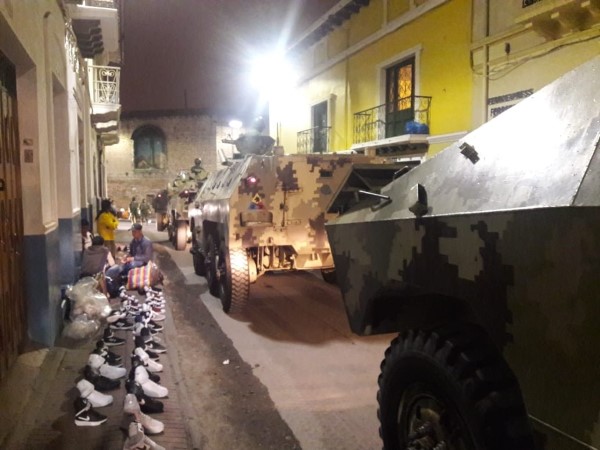
Armored vehicles in Quito, near the Presidential Palace, night of October 6
Instead of responding to citizen demands, the government decreed a state of emergency for 60 days, ordering the mobilization of the armed forces and police to repress the demonstrations. As a result of this measure, there is one person dead, hundreds of people arrested, assaults on journalists, young people wounded with firearms and tear gas bombs, people who have been beaten up and harassed.
War is declared. The worst manifestations of neoliberalism are back.
Many reasons to protest
The rise in fuel prices is the trigger for the recent mobilizations, but the general discontent that reigns in Ecuador has broader and deeper roots, since the moment when Lenin Moreno turned his back on the government program by which he was elected President.
Moreno's initial cabinet was replaced by representatives of the chambers of commerce and production and the private media, who are imposing their own vision and their sector and class interests in order to reap enormous benefits from the state administration.
When the economy was showing signs of recovery, these sectors constructed a narrative that the country was experiencing the worst crisis in history, for which the previous government is responsible. After adopting a series of measures, such as pardoning fines and interest on the arrears of the large economic groups that have debts with the State, which total more than 4.5 billion dollars, the economy has gone from bad to worse. Among the main impacts are the increase in poverty and extreme poverty, the reduction of adequate employment, the growth of underemployment, the dismissal of public servants, greater insecurity and violence, and the government's inability to address serious problems such as violence in prisons, illegal mining and the border situation.
Paradoxically, while the majority of the Ecuadorian people are going through serious economic and social problems, minority sectors are increasing their profits in the midst of the crisis. The banking sector, for example, in 2017-2018, made a profit of 554 million dollars, which represents an increase of 39.8% over December 2017.
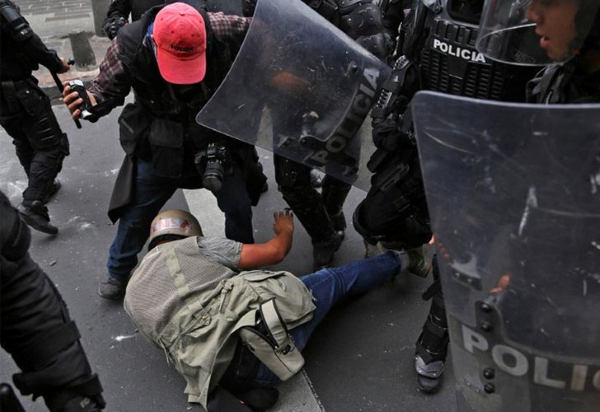
Assault on journalists
On the other hand, the government, instead of seeking to finance the budget with a tax policy under which those who have more pay more, collecting the debts of big businessmen and combatting tax evasion and avoidance, has resorted to external indebtedness in conditions that are extremely disadvantageous for the country.
Despite criticizing the indebtedness of the previous government, Moreno's government in the first 19 months (from May 2017 to January 2019) borrowed 11.72 billion dollars, surpassing the total debt contracted by Rafael Correa's government, which in 9 years and 3 months of management went from a total of 10.20 billion in August 2007 to 22.58 billion in June 2016 (Source: Banco Central del Ecuador).
Under these conditions, the government resorted to the International Monetary Fund, with which it signed an Extended Fund Facility, EFF, in exchange for a loan of 4.2 billion dollars, undertaking to comply with the conditions of this organization, which include increasing VAT, raising and liberalizing fuel prices, the privatization of strategic sectors, so-called labor flexibilization, which in reality means attacking the rights of workers, reforming the statute of the Central Bank, reducing the size of the State with layoffs of public servants, among others, in order to achieve "fiscal balance". It should be remembered that the last agreement with the IMF took place in 2003, during the government of Lucio Gutiérrez, which did not end its period because of popular rejection.
President Moreno, with a level of credibility bordering on 16% and acceptance of only 22% of the population, thus imposes a package of economic measures that has received public support from the IMF, the business chambers, bankers and the corporate media, which have closed ranks to defend the measures, pointing out that the government has had the "courage" to "withdraw the subsidy" on fuels, "something that has not been done in the last 40 years.”
The rise of diesel and gasoline prices will have a harsh impact on the popular economy, as the prices of basic necessities and public transportation will increase, deteriorating the purchasing power of most Ecuadorian families, with a much harsher impact among those who earn the basic wage or have reduced incomes.
Transport strike and popular mobilization
Since Thursday, October 3, a strike of transporters has affected the whole country, classes are suspended and the working day has been shortened because of the transport difficulties. This was the trigger for other sectors to mobilize against the measures of Lenin Moreno's government in several cities, especially Quito.
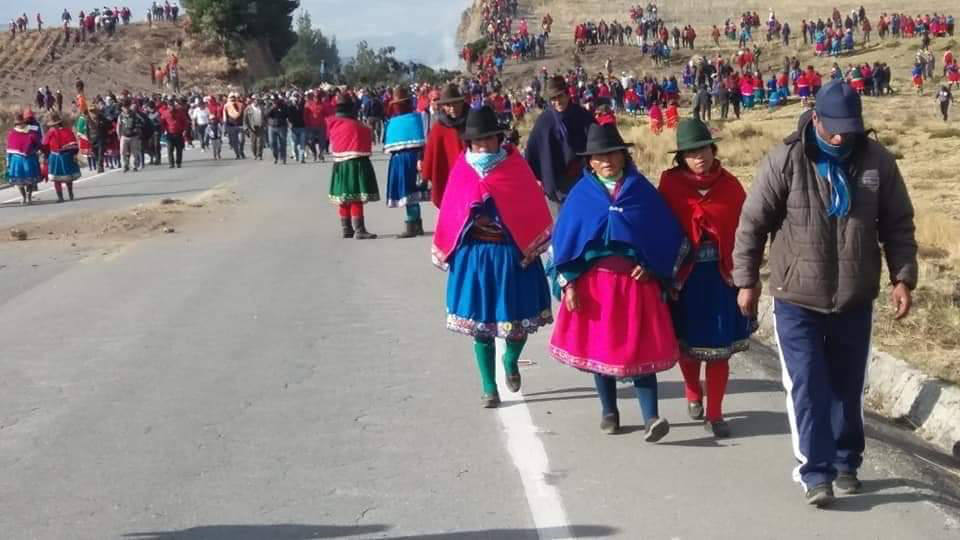
Indigenous Mobilization in the Central Sierra
After a partial agreement between the government and transport leaders and the resumption of certain transport lines, the mobilization of the indigenous communities in seven provinces of the Sierra, as well as in the Amazon region, broke out with great force.
From Saturday, October 5, the indigenous people closed the highways, placing barricades and tree trunks, while holding rallies in various provincial capitals. The objective of the indigenous struggle is not only to demand the repeal of the package of economic measures, but also the suspension of concessions for open-pit mining and other demands in defense of small-scale agriculture, for which they had previously been demonstrating.
In response to the declaration of the State of Exception, the repression unleashed and the imprisonment of Pachakútic leaders, Marlon Santi and Jairo Gualinga, the Confederation of Indigenous Nationalities of Ecuador, CONAIE, issued a statement in which it declares the state of exception in all indigenous territories and indicates that "military personnel who approach indigenous territories will be detained and submitted to indigenous justice.” The measure was announced in response to "the brutality and lack of awareness of the public force to understand the popular character of the demands of the National Strike against the Package, which affects the whole of Ecuadorian society and deteriorates the living conditions and existence of the most vulnerable sectors of the country.” The indigenous organization denounced that military and police contingents had harshly repressed indigenous mobilizations, even attacking women and children, including at least one fatality.
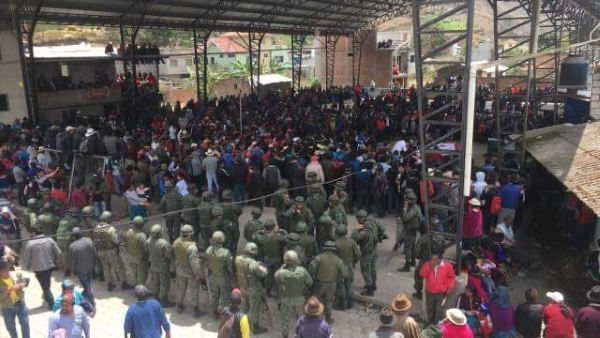
Military servicemen held by Indians
The CONAIE, together with the United Workers Front (FUT) and the Popular Front, called for a national strike on October 9, and as from Monday, October 7, are holding demonstrations, while thousands of indigenous people travel to Quito to protest.
The corporate media and the "public" media have closed ranks around Moreno's government and its policies. They join the official story, silence or minimize the protests, and make biased coverage trying to convey the idea that "nothing is happening" in the country. These tactics are already familiar and reiterative behavior that are rejected not only by those who participate in the mobilizations but also by broad sectors of the population that keep informed, summon actions and express their opinions through digital social networks and via the few community and public media that remain. One of these is the Radio Pichincha Universal of the Provincial Council of Pichincha. Its coverage of the mobilizations has a wide audience in Quito and the province of Pichincha and listeners permanently participate in its broadcasts, sufficient reasons to make it the object of persecution. Since October 3, the radio suffered several cuts to electricity supply and attacks on its website (www.pichinchauniversal.com) and have received various pressures from the authorities.
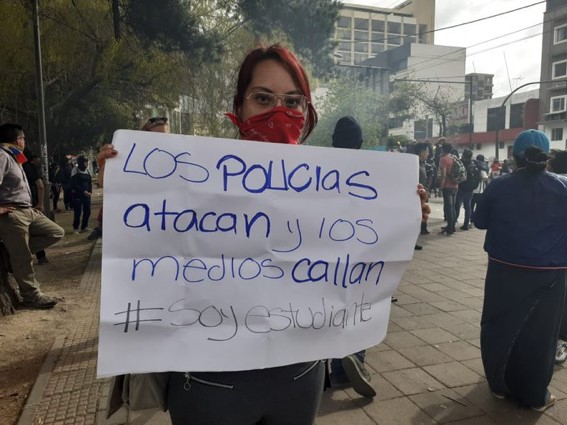
The police attack and the media are silent. #IAmAStudent
State of Exception... greater repression
The resort to declaring a State of Exception by a government with such low popularity, rather than showing strength, is a sign of weakness and that it prioritizes force over dialogue. The 60-day State of Exception suspends the right of association and assembly 24 hours a day, limits the right to freedom of transit, and enables the mobilization of the armed forces and police "to maintain order.”
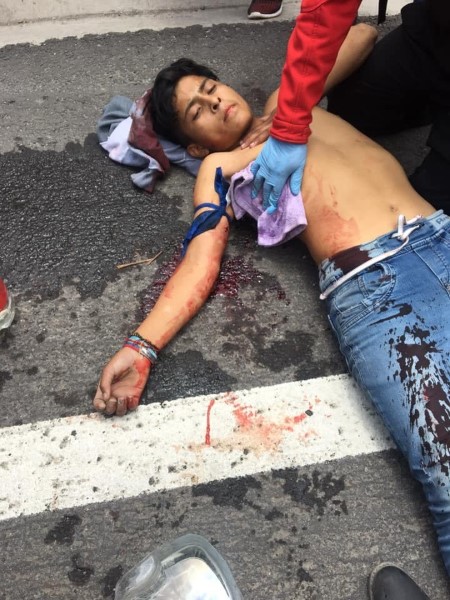
A young demonstrator wounded with rubber bullets in the Cayambe canton, northern Ecuador
Under this framework, 24,000 military personnel and thousands of police have been mobilized to contain the popular protest. And as if we were at war, a series of atrocities, arbitrariness and human rights violations are being committed, which have been denounced by national and international NGOs. According to the Minister of Government, María Paula Romo, as of Sunday, October 6, the number of detainees was 477.
While armored Urutu EE-11 Army vehicles and military red berets were placed in front of the Palace of Government on the night of October 6, the Minister of Defense, Oswaldo Jarrín denied it, and at the same time stated to a public media outlet that: "the Armed Forces know how to defend themselves, they have experience in combat and war, they cannot be insulted, they have honor, they have dignity and they will be respected".
International questioning of Moreno's government
On the same day that the measures were announced, the United Nations Committee on Economic, Social and Cultural Rights questioned the Ecuadorian State about the adoption of the structural adjustment advocated by the IMF and its impact on the enjoyment of human rights. The following day, in an unusual gesture, the Committee issued a strong statement in which it pointed out that the reduction in the State institutions and budgets through implementation of the agreement with the IMF are incompatible with Ecuador's international obligations and negatively affect the enjoyment of economic and social rights.
Similarly, United Nations and Inter-American System bodies have expressed extreme concern about the disproportionate use of force and the lack of due process during the repression and detention of dozens of people during demonstrations. Moreover, the declaration of a national State of Exception increases the risk of human rights violations, the legality of which must be reviewed by the Constitutional Court. These measures of last resort, in force through Executive Decree 884, emitted a few hours after the announcement of the economic measures, could constitute an illegitimate restriction on the right to demonstrate peacefully, on freedom of expression and opinion, by suspending the right to freedom of assembly and association. According to the UN body, these rights, guaranteed in international instruments and in Ecuador's Constitution, are being violated by the State itself, which is acting disproportionately to the demands of the situation. It is also the framework in which there have been several complaints of violations of the physical integrity and procedural rights of citizens held in custody.[9]
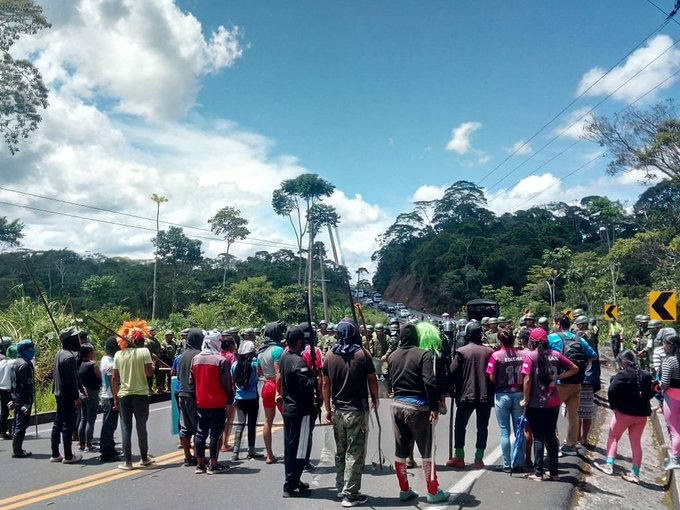
A paralyzed Amazonian trunk road
The UN Special Rapporteur on the Rights of Indigenous Peoples, Victoria Tauli-Corpuz, expressed concern about the situation of indigenous peoples in the context of protests in Ecuador and urged the government to avoid excessive use of force, respect human rights, and seek a solution to the conflict through intercultural dialogue.
(Translation: ALAI This is an abridged version of the original article).
Notes
Pachakutik is a political movement of mainly indigenous composition.
At the time of publishing this translation, on October 9, the Communications Secretariat of the Presidency has ordered that the radio must transmit only the signal of the Public Radio of Ecuador, a clear case of censorship. The radio staff have announced that they will continue to broadcast through their channels on social networks.
Del mismo autor
- La derecha, Facebook y el odio a Chávez 06/02/2020
- Galápagos: De patrimoine de l’humanité à porte-avions des USA ? 17/01/2020
- Revuelta popular tumbó el paquetazo del FMI… pero las heridas quedan 15/10/2019
- Ecuador: A curfew and the people still resist 13/10/2019
- Ecuador: Toque de queda y la gente resiste 12/10/2019
- Austerity measures of Moreno and the IMF mobilize Ecuadorians 09/10/2019
- Paquetazo de Moreno y del FMI moviliza a ecuatorianos 07/10/2019
- Galapagos: from world heritage to aircraft carrier of the US? 09/07/2019
- Galápagos: ¿de patrimonio de la humanidad a portaviones de EEUU? 02/07/2019
- 2 años de Lenin Moreno: Giro total a la derecha 23/05/2019








